Beqa

Lochmarin
Thu 20 Aug 2015 00:21
18:24.196S 178:06.009E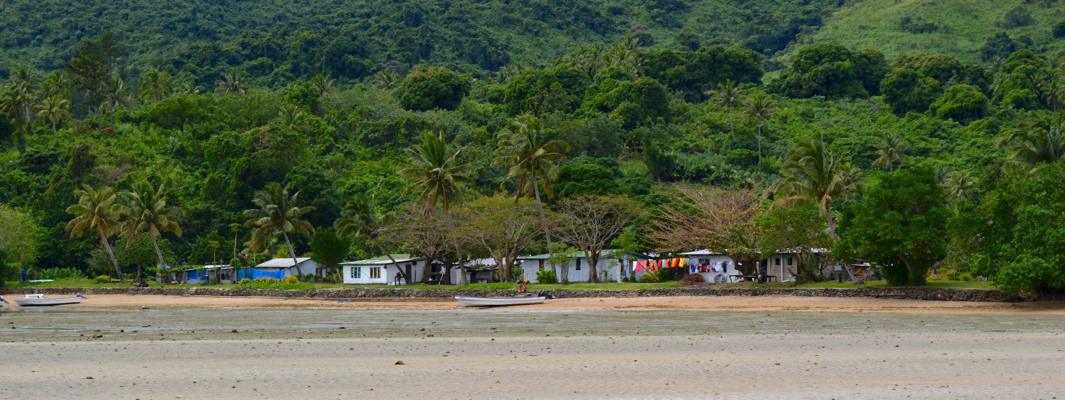 The village of Naiseuseu at low tide. We needed to get away from the rain, and to find some clean, clear water for snorkelling, so we set sail for the West of Viti Levu, but decided to stop at the island of Beqa (pronounced Benga) on the way. This is the island where they traditionally do fire walking, walking on big rocks that have been heated in a bonfire for hours. We could have seen them fire walk if we’d gone to one of the resorts, but we headed for a nice sheltered little anchorage next to a village of about 100 people, Naiseuseu. We arrived in the late afternoon so decided not to go ashore that evening, but to leave it until the morning to go and find the Chief, ask acceptance into the village and take part in the sevusevu ceremony. It was a good job we did as we soon saw that the villagers were busy. A group of women and children collected on the beach blowing conches, the women were holding long lengths of cloth, like big banners. A small motor boat arrived and entered the pass in the reef in front of the village, amidst much shouting from land and boat and a number of young men dived off the boat to swim ashore. When they got there they chased the women and children off the beach, with much laughter and good nature. It turned out that this was the family of one of the wives in the village, come over from an island in the Lau group, to make the traditional visit after a woman has her first child, to celebrate and meet the child. Next morning we headed in, having watched the local fishing boats come in and out to work out where best to land our dinghy. We came ashore alongside the village pigsties, and were soon greeted by Sero who took us straight to the chief for sevusevu. We had come with the traditional gift of kava root, which was gladly accepted and we were welcomed into the village hall - which seems more of a chill spot for the men of the village to drink kava in than what we’d think of as a village hall. The ceremony was enchanting, with the chief reciting the traditional speech, interspersed with percussive claps (cobos). The other men joined in at times and then we three were given kava to drink in turn, Phil first, of course, then Jon, seeing he’s male, finally me, being last on the pecking order - no comment! Then that was it, we were officially part of the village. 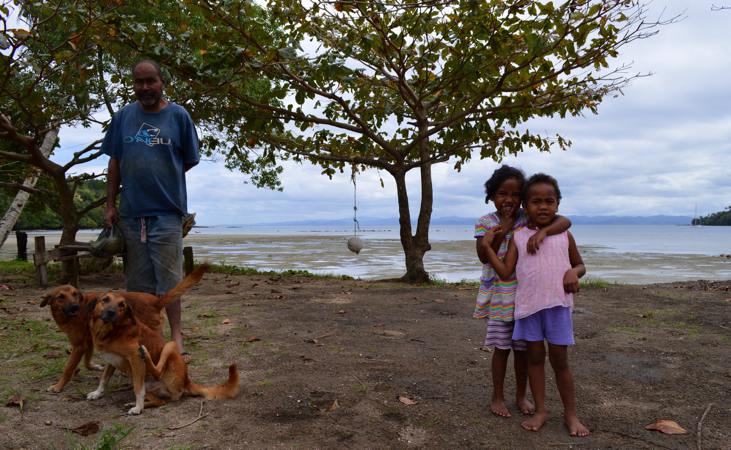 Sero, his dogs and his girls. He’s holding a bag with breadfruit in for us. You can just see Lochmarin at anchor, against the trees on the far right. First things first, Sero wanted to know what Phil had done in the world of work. When he replied that he’d been an engineer he and Jon were whisked off to look at the village generator, which had stopped working. Phil promised to look on the boat for tools and return that afternoon so we were able to head back out to the boat and from there we got changed and got straight back in the dinghy to go for a long awaited snorkel. It was so good to dip under the cool water, feeling the sunshine on our backs and reenter the underwater world we’d missed so much whilst in New Zealand. And there they were, so many of the characters we’d come to love: the cheeky damsel fish, the beautiful butterfly fish, always in pairs, pipe fish and parrot fish. But what we hadn’t expected and were delighted by was the wonderful coral. So many colours and shapes and patterns, bright blues and pinks and oranges set in fields of staghorn coral, a delicate cream colour with purply blue growth tips. We discovered later that Fiji is the soft coral capital of the world. After lunch, weighed down by tools, Phil and Jon returned to the generator hut and I wandered off to look around the village and soon had a crowd of children with me, three hanging on to each hand, more following at my heels, yet more running ahead. They were very sweet, rather snotty, and had very little English but chattered away in a friendly fashion. I’m sure the cookies I’d baked had nothing to do with my popularity. I and my retinue paraded the village and stopped to chat with a couple of the women, lovely people, who were glad to know more about us. The time passed in a flash and when the men folk reappeared, having declared the generator dead and then been encouraged to go drink kava for a while, I had new friends. I was a little sad when one of the men growled in Fijian at the children, who were quarrelling between themselves as to who should get to hold my hand, and without a sound the little ones slipped away to their homes. Of the folk I met that day, two stood out in my mind. One was a grandmother - she said she was 80 but I think a bit less, who spoke English well and had been to visit America once for two weeks. She invited us to come and spend time with her and when she heard we were coming to church the next day asked us to eat with her and her family. She had a bright, lively face and a ready smile. The other was a young lady of perhaps 15 or 16 years old. I didn’t speak with her but as we were leaving she took both my hands in hers and looking straight into my eyes said one word. I had no idea what it meant, perhaps just ‘goodbye', but the intensity with which it was spoken stayed with me. I would have liked to have got to know her.  Our hostess with her grandchildren. The chair in the background was their only one, brought in especially so I wouldn’t have to sit on the floor (where I was perfectly happy, of course, and I felt rather strange on the chair). The houses were simple, with an outside ‘kitchen’ with a wood fire, usually opposite a door so as to be easily watched from inside. 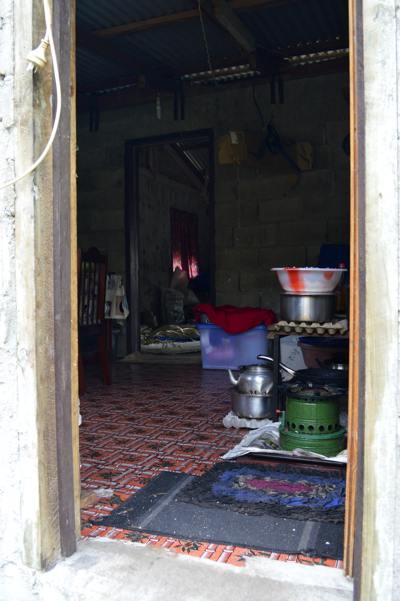 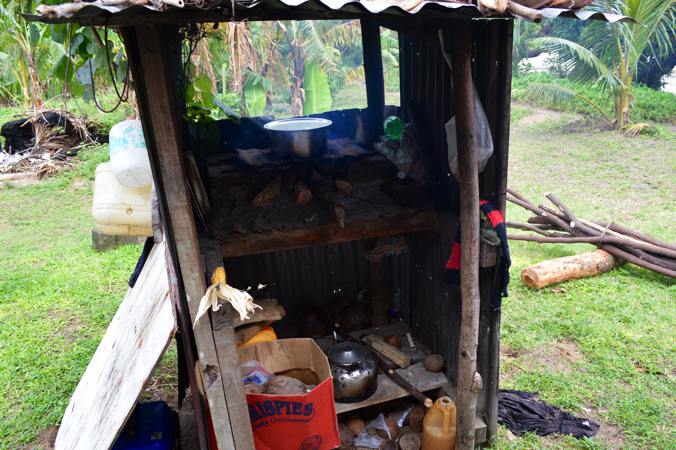 Back up paraffin stove just inside the back door, and eye level cooking fire in the outside kitchen. There are woven mats on the floor, which the women folk make themselves, and sleeping areas are partitioned off with material. They also make tapas out of mulberry bark, which they decorate with homemade inks. Big ones are also used as room dividers. 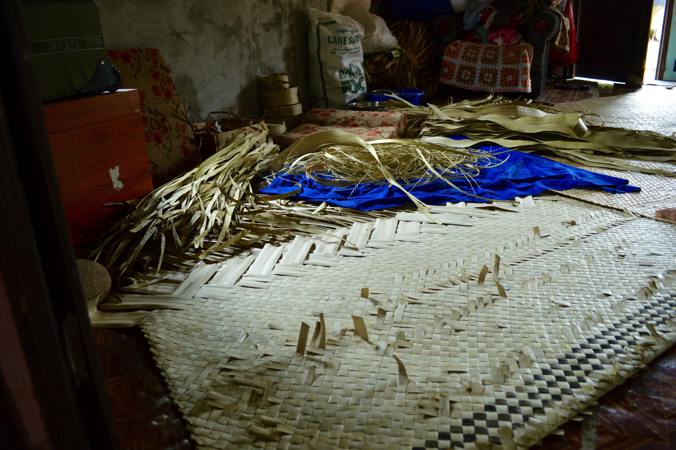 Mat weaving. Come Sunday we all dressed up in our finery to go to church. Phil and Jon wore man skirts, sulus. Jon’s was a very smart pinstriped affair, with built in pockets, Phil's a little less formal (Jon banned me from posting the pictures on here, I can’t imagine why!). We were a little worried as we were going to be a few minutes late and we rushed to the church for 10 o’clock, having heard the drum being beaten for the ten minutes before hand. We needn’t have hurried, Sero was waiting to greet us and clearly in no rush, still we were sat down by 5 past 10 and waited for the service to start. Most of the children were there, sat on the front benches, wriggling and giggling as all kids do in church, with teenagers trying to keep order, complimented by a scowl and stern word from one of the adults now and again. Time went by and people drifted in. Half past came and went. Quarter to 11 came and went, with still no sign of any start to the service, people were still turning up in ones and twos. Then, suddenly, with no previous sign, the choir started to sing and the elders came in. The service had started. Of course, we understood nothing, except we recognised when everyone was saying what must have been The Lords Prayer, so we joined in in English. However, the singing was magical - no instruments, just one chap using the end of the pew as a drum to mark time, and at one stage everyone prayed, out loud, all together, all different prayers, and the hairs stood up on the back of my neck. There was clearly a very powerful sermon, during which I let my eyes turn to the windows, seeing palm trees and mango trees, with chickens and dogs strolling by. Then it was over, at least we thought it was, all the kids were the first to troop out but most of the adults stayed in place. Was it just the Sunday School leaving with some adults to teach them? A kind lady let us know it was actually finished, some folk were staying for a village meeting, so we slipped away to go share lunch, a feast of parrot fish, breadfruit, green papaya cooked in coconut cream and rice, supplemented by the pasta and beef dish we’d brought along. During our stay Phil and Jon went fishing with Sero and, although they were unable to fix the generator, the original shaft coupling had disintegrated, Phil wasn’t too worried as the Government were sending someone to discuss setting up solar panels for the village the next day. We traded for breadfruit, papaya, tomatoes, and coconuts - both green and brown. In exchange we gave batteries, fish hooks, fishing line, petrol, reading glasses, plasters and toilet paper. Of course, the fresh food was very welcome, but mostly we took away a wonderful time being welcomed into another culture and way of life. Definitely a win win situation for all involved! 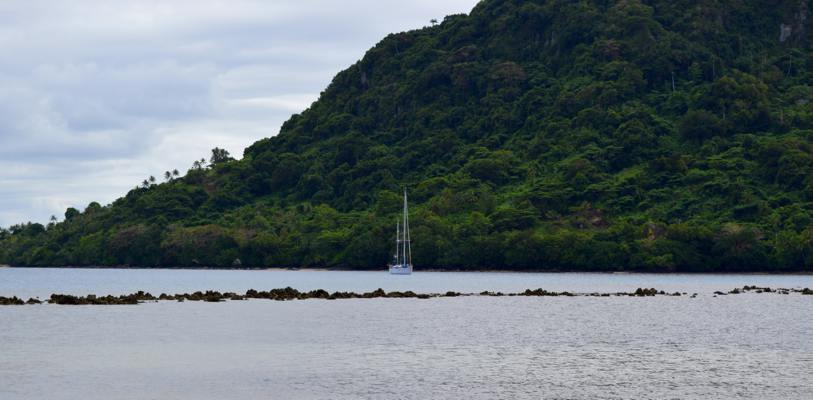 looking over the reef at Lochmarin at anchor in Vaga Bay, taken from the village. |